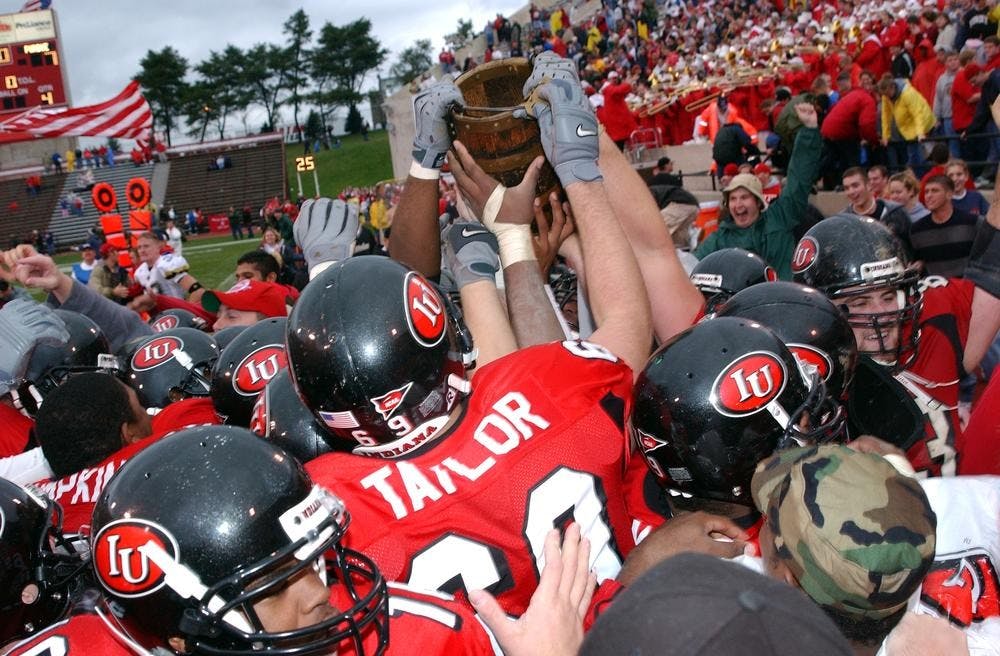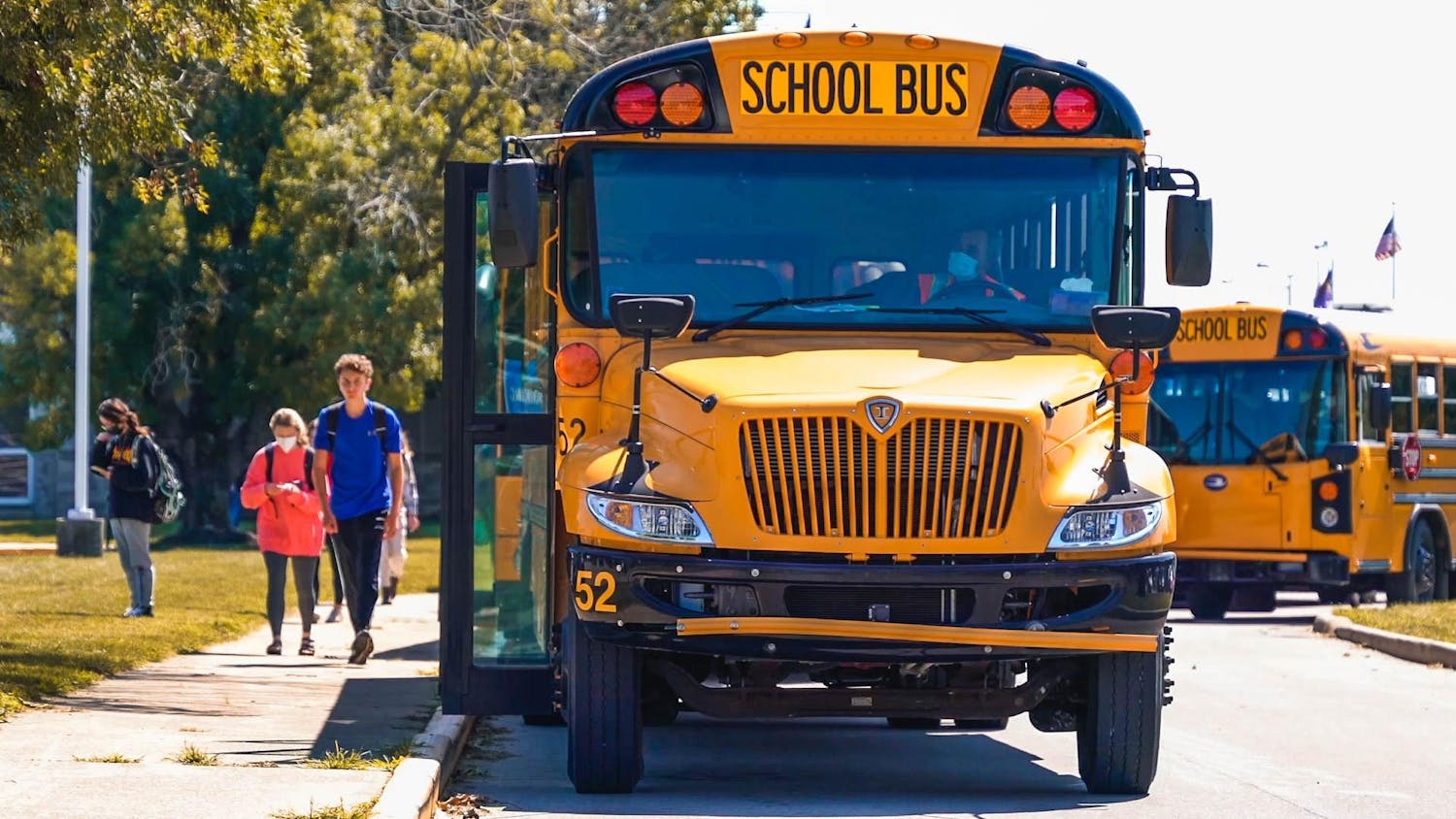The official announcement came just after 2 p.m.
IU head coach Tom Allen later said it made him feel “sick.”
It was on Tuesday, though, that it started to crumble.
Earlier in the day, the Ohio State-Michigan game was canceled due to positive COVID-19 tests. Then there was word out of West Lafayette that Purdue canceled its practice due to COVID-19 concerns. Later that night, IU announced that it had paused all team activities due to the coronavirus.
In a world controlled by the pandemic, IU hadn’t missed a game all year. In August, the season was canceled. A few weeks later, it was reinstated. Then the Hoosiers lost their star quarterback. Still, IU was on its way to the team’s best season since its Rose Bowl appearance in 1967.
This year was supposed to be a beatdown of rival Purdue.
It was supposed to be IU's second consecutive Old Oaken Bucket win. It was supposed to be a coronation of IU football’s emergence with high-flying chest bumps from Allen, interceptions from Tiawan Mullen and touchdowns from Whop Philyor.All of the frustration of being knocked out of the Big Ten championships would've been taken out in 60 minutes on the field.
But on Dec. 9 all of those hopes were gone.
This will be the first season since the bucket's introduction in 1925, there will be no game. The last time IU and Purdue didn't play each other in football was 1919 after a dispute over two Hoosier players' eligibility.
For the past nine months, the bucket has been nearly untouched. The only time it was taken out was to carefully wipe down the wood and polish the brass links.
In a normal year, it would've been showcased at alumni events and flaunted around the state. Before the COVID-19 pandemic hit, it was brought to the Indiana House and Senate.
Instead, over the last nine months, the Old Oaken Bucket has rested alone inside a glass display case in the IU football locker room. It's the first thing players see when they enter. In a room behind it, there are COVID-19 testing materials.
The allegedly more than 150-year-old slab of wood shows its age. It’s been discolored from a dark brown to a light hazel. It’s covered with scrapes and scratches.
Over the years, coaches have cried about it. After games, it has been taken back to coaches’ houses for sleepovers. Hundreds of players have touched it. On occasion, it has been stolen by fans.
This year, March Madness had already been canceled. The NBA and MLB seasons had been paused. Life as everyone knew it was in shambles. Businesses closed, uncertainty reigned, anxiety spiked. And now, in a year that has taken so much, it's the Old Oaken Bucket.
Saturday would’ve been the 96th Old Oaken Bucket game.
Now all that’s left is the memories.
Those can't be washed away.
The game was scheduled to be at 3:30 p.m. on Saturday where IU would’ve played Purdue for a bucket that was allegedly found at a farm in Indiana. There are, however, many stories about the origins of the Old Oaken Bucket.
In one version, an employee of American Steel Foundries in Illinois said that the bucket was brought to him to be restored. Another account claimed that a bucket was brought to Bruner Farm in Indiana and lowered into the well a couple of times to add significance to the trophy.
The most well-cited story, though, is that the bucket was actually discovered on the Bruner Farm after it had been used there for decades by the family.
In recent years, Bill Bruner would watch the Old Oaken Bucket games inside of his home in Hanover, Indiana, but had never attended one himself. He would yell his frustrations at the screen, asking the referees when they’d never give a call in Indiana’s favor.
“Ohio State, they get all of the breaks,” he'd say.
His wife would remind him that they couldn’t hear him through the TV. At some point during the broadcast, the announcers would mention the origins of the bucket, Bruner farm.
That’s my family, Bruner would think to himself.
Bruner’s great-grandfather owned a farm in southern Indiana between Hanover and Kent. The land stretched acres with a white farmhouse and water well on the property.
Growing up, Bruner didn’t know much about his great-grandfather's farm. His mom told him a story about how Morgan’s Raiders, a Confederate cavalry unit that was deployed into the northern states, once trekked through a creek and stopped by the well for a drink.
According to the most popular version of the story, in 1925 the Chicago alumni chapters of Purdue and IU came up with the idea of finding a trophy for the winner of the football game. It was recommended that Indiana alumnus Dr. Clarence Jones and Purdue alumnus Russel Gray find an old oaken bucket, which was "the most typical Hoosier form of trophy."
Eventually, the duo came across Bruner farm where they found a bucket hanging in a well and decided it was a suitable trophy. It was then named after the 1817 poem “The Old Oaken Bucket,” by Samuel Woodworth. The poem was written about a Massachusetts homestead with a well and was often sung by schoolchildren.
“The old oaken bucket, the iron-bound bucket,” the poem reads. “The moss-covered bucket which hangs in the well.”
Soon after, the bucket was presented at the 1925 contest at Memorial Stadium in Bloomington. The inaugural Old Oaken Bucket game, where players wore leather helmets and long sleeve shirts, ended in a 0-0 tie. The first “I” and “P” links were connected on the handle of the bucket.
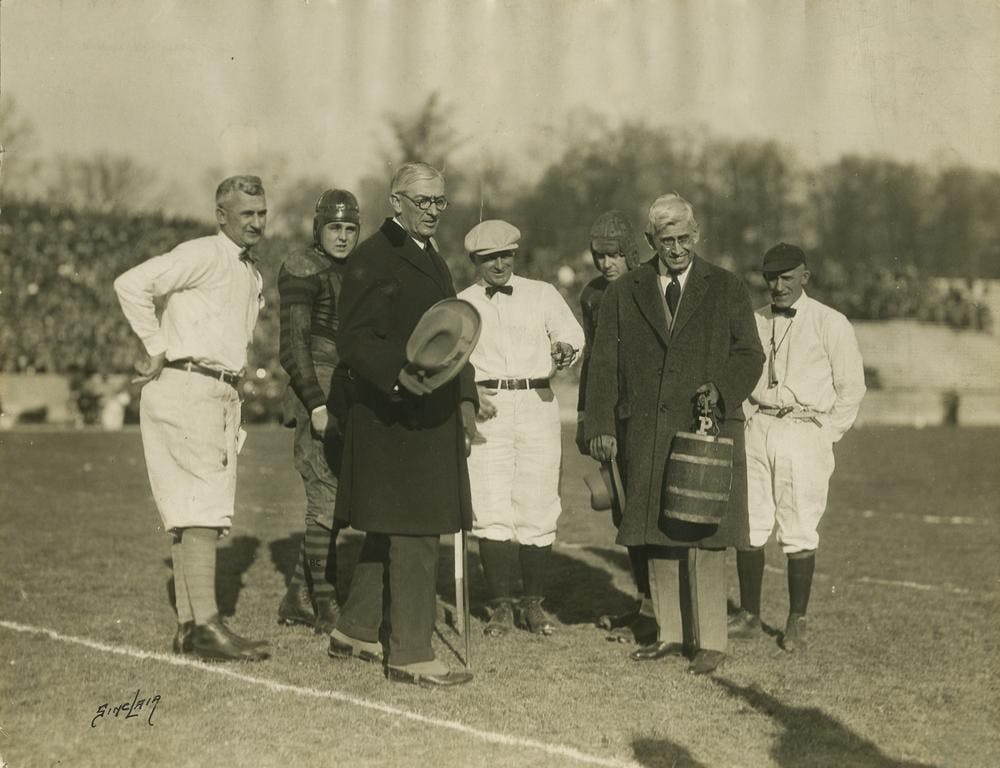
It didn't take long for resentment to bubble over the bucket.
In 1930, after IU's first victory since the bucket’s introduction, it mysteriously went missing and eventually turned up outside the Lafayette Journal and Courier office. Nearly 30 years later, three IU fans swiped the iconic trophy from the campus in West Lafayette.
Earlier in his life, Bruner didn’t think much about the bucket and its history. His stepfather was a huge IU basketball fan and they’d regularly tune into games. Bruner watched the legendary coach Bob Knight infamously throw a chair across the court. But Bruner didn’t watch much IU football.
“They were supposed to lose,” Bruner said.
Bruner didn’t have a stable relationship with his father Clayton, and it wasn’t until 2015 when Clayton’s health was declining that Bruner started asking about the farm. During that time, Bruner’s wife dug up an old letter that Clayton had penned in 2003.
“I’m Clayton Bruner, 64 years old and the late grandson of the late William and Cora Bruner…” Clayton wrote. “...I would listen to the game on the radio and they would always talk about the Bruner farm and the Old Oaken Bucket. I would like very much to correspond with the university about the prized trophy.”
Bruner’s wife decided to reach out to the IU athletic department to try to arrange a meeting. Mark Deal, the assistant alumni director at IU and “keeper” of the bucket, returned their call. Shortly after they connected, Clayton died.
The family continued their efforts to meet with Deal. In the summer of 2016, Deal and Bruner traveled down 300 yards of a country road weathered by tire tracks with the bucket. At the end, there was the farmhouse covered in chipped white paint.
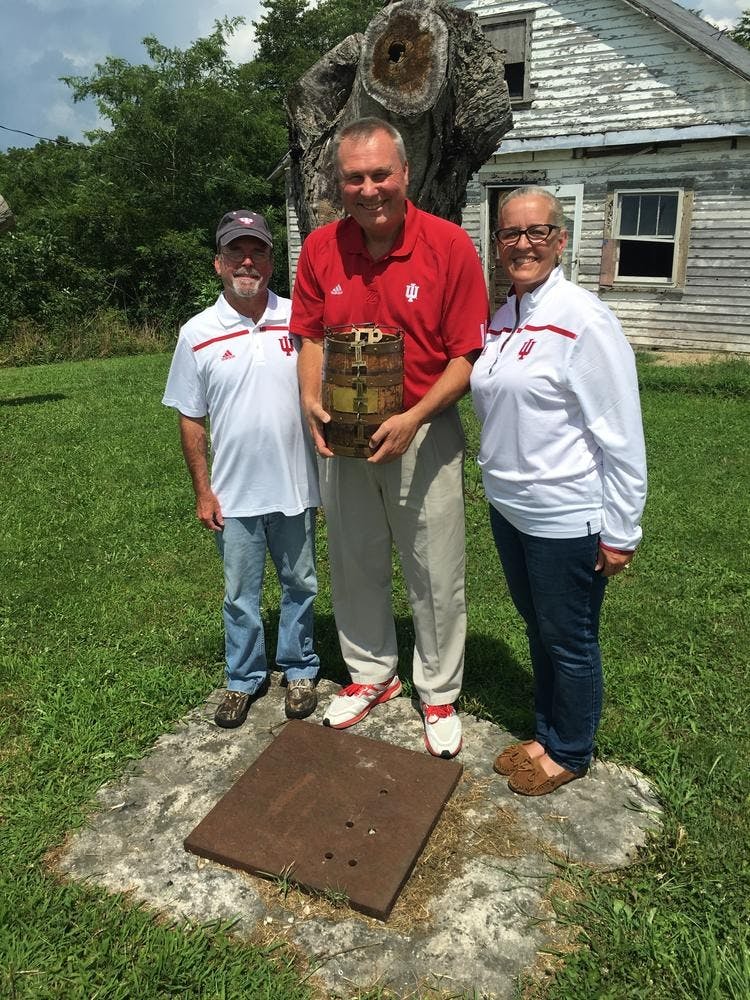
“I still think that there’s a sense of pride there,” Bruner said. “That’s my last name. I wish we’d be a part of it going back when I was in my 20s, but things happen for a reason. I’m a firm believer in that.”
The following fall, Deal invited Bruner and his wife to their first Old Oaken Bucket game at Memorial Stadium. They watched practice during the week. Bruner did the pregame coinflip. IU ended up prevailing 26-24.
After the game, Deal told the Bruners to follow him into the locker room. As they trailed Deal, Bruner was eating popcorn out of a replica tub of the Old Oaken Bucket. In the locker room during the celebration, then-head coach Kevin Wilson settled the team down.
“Put that popcorn bucket down,” Wilson told Bruner. “Come here and grab the real bucket.”
Now, the farmhouse is gone. It was burned to the ground during a drill for local firefighters. Much of the Bruner’s old farmland was turned into a golf course. But what still remains is in Bruner’s attic.
That’s where the Old Oaken Bucket popcorn tub still sits.
Standing in the locker room before the 1977 IU-Purdue football game, Lee Corso made a promise. Corso, who is now a college football analyst on ESPN, was in his fifth year as IU’s head coach and coming off of a win over Purdue the prior season.
As a symbol of his vow, Corso placed a football in the Old Oaken Bucket before the 1977 contest.
“We’re going to give the game ball to the Etherton family after we win the bucket,” Deal recalls Corso saying.
Deal was a junior at the time. His family accumulated a total of eight victories over Purdue in their playing careers. His father, Russ, was a captain of the 1945 Hoosier football Big Ten championship team. His brother, Mike, was part of the 1968 IU Rose Bowl team.
During that season, one of Deal’s teammates, Scott Etherton, was killed in a two-car collision the Sunday prior the IU-Purdue game. Etherton was a walk-on defensive back. He was studying forensics at IU, a member of Sigma Alpha Epsilon fraternity and was involved in Little 500 activities. He was respected by his teammates and coaches.
Etherton was 22.
Three days after his funeral, his teammates played for him in the Old Oaken Bucket game.
“I was 20 years old then. You’re indestructible,” Deal said. “You don’t think that things like that are going to happen to anybody.”
On the field that day, Hoosier running back Darrick Burnett carried the ball 43 times for 196 yards in IU’s 21-10 win.
After the game, there were tears. There was hugging. Corso tried to calm everyone down.
“I want one thing: to fulfill our promise,” Corso said. “Mr. Etherton, here’s the game ball.”
All these years later, these are the types of stories Deal recollects with his former teammates at golf outings “like it was yesterday.” Deal's wife watched him play in Old Oaken Bucket games, although the two didn't know each other at the time and met later.
When Corso took over as head coach in 1973, IU had lost 21 of the last 25 matchups against Purdue. The bucket wasn’t even brought to one of Corso’s first rivalry games because it was assumed IU would lose.
Later, Deal and Corso were part of back-to-back bucket victories in 1976-77, making it the first winning streak for IU over Purdue in 30 years. Deal attributes Corso with re-igniting excitement in the rivalry.
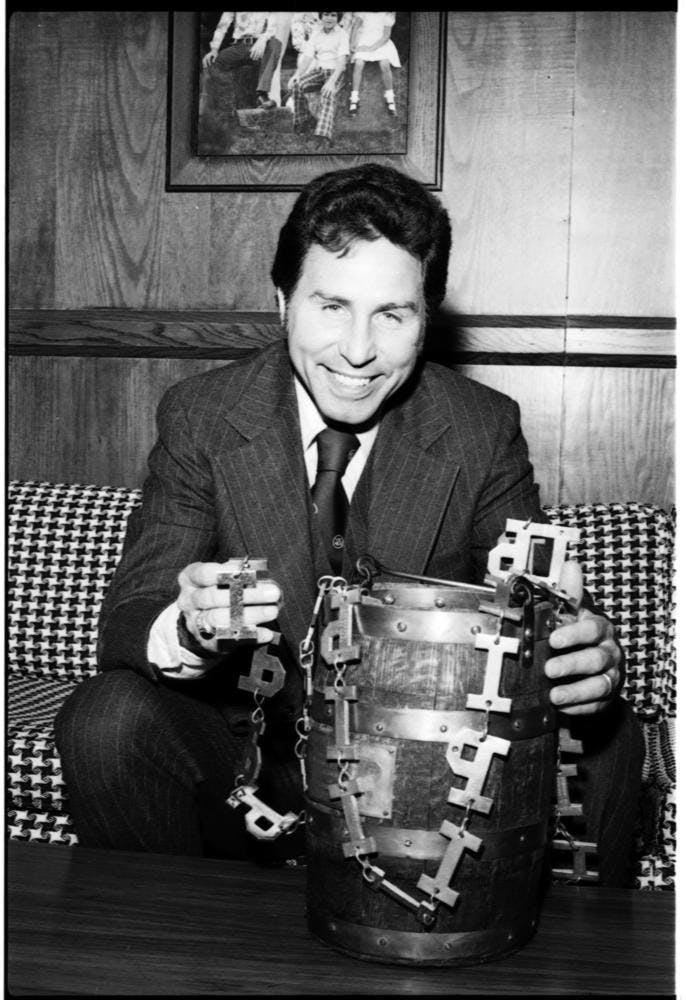
Corso had a sign above his office door that read: “What have you done to beat Purdue?” They finished every practice with a yell of “Beat Purdue.” It didn’t matter if it was early in the season and they were playing Minnesota. It was always “Beat Purdue.”
“It was a 365-day thing for Coach Corso,” Deal said.
After Corso won the bucket for the first time, he brought it home and slept with it in his bed. Another time, the bucket was filled with flowers and used as the centerpiece for the Corso’s family Thanksgiving feast. It sat next to the turkey.
Even after Corso left IU in 1982, that passion continued.
In 1993, Indiana safety Chris Dyer delivered a scornful message about Purdue ahead of the upcoming game.
“They’re all c---suckers,” Dyer said in an article in the Indiana Daily Student. “Their coach is a c---sucker. What the f--- is a Boilermaker anyway? I hate that town too.”
Indiana won that game 24-17.
All of the emotion surrounding the pail continued. In 1996, when Deal returned to Indiana as an assistant, IU was in the midst of a coaching change. Deal knew that meant the bucket was unattended. On Christmas Eve, Deal snuck into an empty Memorial Stadium, unlocked the trophy case and took the bucket home.
“Mike, guess what’s on our table for Christmas dinner,” Deal said to his brother.
“What?” his brother responded.
“The bucket,” Deal said.
“I’m so jealous.”
Deal did the same thing in 2010 before former head coach Kevin Wilson took over at the helm. Deal admits the bucket has been in his bed, too. It was tucked on Deal’s half of the mattress, away from his wife.
“She didn’t want it near her side,” Deal said.
Now, looking back on his career, Deal can't decide a favorite bucket game.
“I have five grandchildren. It’s like ‘who’s your favorite?’ Well, I don’t have a favorite, they’re all special. It’s like the bucket wins, they’re all special," Deal said.
"They’re all beautiful children.”
They knew where to look for him. The keeper told them all week where he was going to be.
They knew he’d have the bucket.
It was double-overtime of the Old Oaken Bucket game in late November of 2019 at Ross-Ade Stadium in West Lafayette. IU held the lead for most of the game and was hanging on to a 28-17 advantage entering the fourth quarter.
But Purdue surged back, knotting the score at 31 with just under three minutes remaining. In the second-overtime, all IU needed was a touchdown to capture its eighth win of the season.
All they needed was one yard for the bucket.
Deal watched from the back of the end zone. He heard IU quarterback Peyton Ramsey bark out the signal for a quarterback sneak. Ramsey took the snap and looped to the right side of the line, lowering his left shoulder and falling into the endzone.
Deal shook the Purdue representative’s hand and took the bucket case. He didn’t open it because he wanted the players to be the first ones to touch it.
IU defensive back Juwan Burgess was the first one to get to Deal. The keeper held the case over his head, mouth agape as he was engulfed in a swarm of white jerseys. He put the case on the turf, nearly being knocked over as the team ripped it open. In a mosh, they hoisted the bucket in the air, dozens of arms reaching to touch the historic prize.
The keeper raised his arms and jumped in the air.
Shortly after in the postgame press conference, head coach Tom Allen’s voice trembled, his eyes filling with tears. A song by Young Thug blared in the background, signaling a party in the locker room. It was Allen’s first Old Oaken Bucket win.
“I want to thank President McRobbie and Fred Glass for believing in me. A couple of years ago, taking a chance on a small town kid from this great state of Indiana that not many would have done that,” Allen said through sniffles.
Once the music trailed off, the cameras stopped rolling and most of the coaches had left, Allen and Deal remained. Deal held the bucket in his hands. He told Allen the same thing he’s recited to every coach over the years.
“Coach Allen,” Deal said. “Here’s your bucket.”
“Take this home.”
On a day in August, the IU football team was socially distanced inside the Henke Hall Of Champions in the North end zone of Memorial Stadium. Allen delivered the news that there would be no Big Ten fall football season.
Deal cried. He cried for the seniors. He cried for their hard work. Allen told them they were going to stay together and keep working.
And that's what they did. About three weeks later, the Big Ten announced there would, in fact, be a fall season. When games finally started in October, the results were unprecedented. At one point this year, IU climbed to its highest ranking in the Associated Press Poll since 1969, at No. 8.
IU opened the season by upsetting then-No. 8 Penn State in double-overtime after an iconic game-winning dive by quarterback Michael Penix Jr. Two weeks later, IU defeated Michigan for the first time since 1987 and ascended into the top-10 in the AP rankings. Then, when IUs shutout Michigan State and won the Old Brass Spittoon, Deal rubbed it down with disinfectant wipes.
After beating then-No. 16 Wisconsin last week, the Hoosiers now hold a 6-1 record and are ranked No. 12.
Then came bucket week.
After all of the uncertainty, it seemed like the game would happen. Veteran players would pass on the bucket’s significance to the underclassmen. Deal would still get jitters. The hatred was still there.
“My dad is not a big fan of Purdue and neither am I,” current IU starting quarterback Jack Tuttle said earlier this week.
During bucket week, Deal’s office voicemail used to be recordings of longtime radio broadcaster Don Fischer announcing big plays from the rivalry, but he can’t figure out the technology anymore. Other fans have Old Oaken Bucket coffee mugs and Christmas ornaments.
“I don’t consider that memorabilia,” Deal said.” I consider that treasure.”
Instead of being at Memorial Stadium, Deal will lounge in his basement and watch other college football teams play. Around him, there are reminders of the bucket. He has pictures from Old Oaken Bucket games and replica “I” links in the room.
On Saturday, the bucket would’ve finally been taken out of its glass case. If IU won, there would’ve been a party in the locker room. There would've been the virtual excitement of IU fans in Bloomington and on Twitter.
Instead, for the first time ever, it will have to wait another year.
Even the bucket, dripping in history, can’t escape the virus. But what’s left is too powerful to be taken. Those are the stories of Corso sleeping with the bucket, Deal's Christmas centerpiece and Bruner's return to the farm.
And there are more still to come. Just not this year.
So now, the Old Oaken Bucket sits in its case, waiting for its next link.

